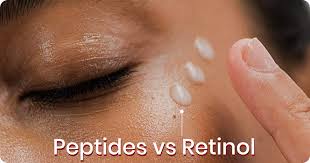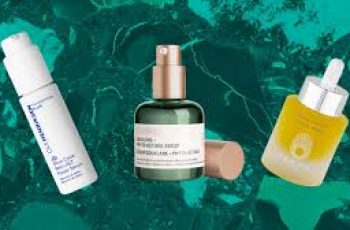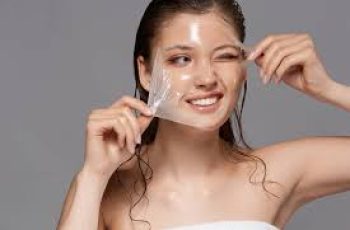
Are Peptides Better Than Retinol? Here’s the Honest Answer
Retinol has long been the gold standard in skincare, especially when it comes to fighting signs of aging. It’s powerful, proven, and widely used by dermatologists around the world.
But recently, peptides have become the new star ingredient. You’ll find them in creams, serums, and eye treatments—all promising youthful, firm, glowing skin.
So, the big question is: Are peptides better than retinol?
Let’s explore what both of these skincare ingredients do, whether they can be used together, and which might be the better choice for your skin type and goals.
Can You Use Peptides and Retinol Together?
Yes, you absolutely can. In fact, using peptides and retinol together can be a powerful combo for healthy, youthful skin.
Retinol works by speeding up skin cell turnover and boosting collagen. Peptides help by strengthening the skin and signaling it to make more collagen naturally.
However, because retinol can be harsh, especially for sensitive skin, it’s best to introduce these ingredients gradually.
Start by using retinol a few times a week. Once your skin adjusts, layer a peptide-based moisturizer or serum on top.
Using both regularly can lead to fewer wrinkles, better hydration, and a smoother, more even skin tone.
Peptides vs Retinol: What’s the Difference?
The biggest difference lies in how much we know about them. Retinol has decades of research backing its effects on fine lines, acne, and skin texture.
Peptides are newer on the scene. While promising, we’re still learning exactly how they work and how effective they are compared to retinoids.
That said, peptides are naturally found in the skin and are generally more gentle. This makes them ideal for people with dry, sensitive, or redness-prone skin.
So, while retinol may deliver faster results, peptides may be better tolerated, especially for those with skin that reacts easily.
What Do Peptides Actually Do?
Peptides are short chains of amino acids. These are the building blocks of proteins, like collagen and elastin, which keep skin firm and youthful.
Topical peptides can:
Signal your skin to produce more collagen
Strengthen the skin barrier
Improve hydration
Reduce inflammation and redness
Help skin look plumper and smoother
Even though peptides are made in your body naturally, applying them in skincare helps maintain your skin’s strength and elasticity—especially as you age.
Is Anything Better Than Retinol?
That depends on your skin type and what you want to achieve.
Retinol is highly effective—it boosts cell turnover, unclogs pores, fades dark spots, and reduces wrinkles. But it can also cause dryness, flaking, and irritation.
If your skin is sensitive or prone to redness, you may find retinol too harsh. That’s where gentler alternatives like peptides or bakuchiol come in.
Bakuchiol, for instance, offers many of the same benefits as retinol without the side effects. It’s plant-based and has antioxidant, anti-inflammatory, and anti-aging properties.
So yes, there are alternatives. They might not work as fast as retinol, but they offer a gentler approach to skin improvement.
Can Peptides Be Used with Acids?
Technically, yes—but there’s a catch.
Using peptides alongside strong exfoliating acids like AHAs or BHAs can sometimes reduce their effectiveness.
This is because acids have a low pH, which may break down the peptide bonds, making them less stable or active on your skin.
To avoid issues, alternate their use. Use peptides in the morning and acids at night—or on different days altogether.
This way, your skin gets the benefits of both without any unnecessary irritation or ingredient interference.
Are Peptides Good for Anti-Aging?
Absolutely. Peptides are one of the most promising anti-aging ingredients in skincare today.
Here’s what they do for aging skin:
Boost collagen and elastin to improve firmness
Smooth out fine lines and wrinkles
Strengthen the skin barrier to reduce moisture loss
Soothe irritation thanks to anti-inflammatory properties
Protect skin from environmental damage
As we age, collagen breaks down and skin becomes thinner and less elastic. Peptides help fight these effects, making them a great addition to any anti-aging routine.
Should You Apply Retinol or Peptides First?
Apply retinol first. Retinol needs to be in direct contact with clean skin to work effectively.
After that, you can apply a peptide serum or moisturizer to lock in hydration and support the skin’s repair process.
This routine:
Lets retinol exfoliate and boost turnover
Allows peptides to nourish and restore the skin
But don’t rush it—start slowly. Introduce retinol two or three nights a week. Add peptides after your skin adjusts.
This slow-and-steady method helps reduce irritation while still getting great results.
When Should You Use Peptides in Your Routine?
You can use peptides morning or night, depending on your routine and skin goals. They’re especially helpful if you have:
Fine lines and wrinkles
Dry or dehydrated skin
A weakened skin barrier
Redness or inflammation
Skin that feels dull or tired
Many peptides are found in moisturizers, eye creams, or serums. They pair well with most ingredients—except for very strong acids.
For best results, use peptides consistently. Daily use can lead to firmer, smoother, and more hydrated skin over time.
How Do Peptides Work in the Skin?
Peptides come in three main types, and each works a little differently:
Signal peptides: Tell skin cells to increase collagen production.
Carrier peptides: Deliver important trace minerals to help with healing.
Neurotransmitter-inhibiting peptides: Help reduce facial tension, similar to how Botox works (but much milder).
Together, these peptides help boost elasticity, minimize wrinkles, and keep the skin barrier strong and healthy.
Peptide Benefits at a Glance
Here are the top benefits of using peptides in skincare:
Stimulates collagen production for firmer skin
Improves skin barrier function for less dryness
Helps retain hydration and reduces moisture loss
Calms inflammation and soothes redness
Visibly smooths fine lines and softens wrinkles
Pairs well with other skincare ingredients, like hyaluronic acid, niacinamide, and ceramides
They’re suitable for most skin types, including sensitive, dry, and acne-prone skin.
Retinol and Peptides: The Dream Team
You don’t have to choose one over the other. Retinol and peptides complement each other beautifully when used properly.
Think of retinol as your skin’s personal trainer—it pushes for results but can be intense. Peptides are like the supportive coach that helps with recovery and strength.
Together, they offer:
Faster cell turnover, Boosted collagen, Reduced wrinkles, Improved texture, Stronger, more resilient skin
Just remember to introduce them slowly and adjust usage based on how your skin reacts.
So, Are Peptides Better Than Retinol?
It’s not really about which is better, but which is better for your skin.
If your skin can handle it, retinol delivers powerful results.
If your skin is sensitive, peptides offer a gentler alternative.
For best results, use both—strategically and consistently.
Understanding your skin type and tolerance is key. Some people benefit from using both daily, while others need to take a slower approach.
Final Thoughts: Which Should You Choose?
Here’s a quick recap to help you decide:
Concern Best Option
Fine lines and wrinkles Retinol + Peptides
Sensitive or dry skin Peptides
Fast results Retinol
Gentle, long-term care Peptides
Maximum anti-aging power Both together (with care)
In skincare, there’s rarely a one-size-fits-all answer. Your skin is unique, and it deserves a personalized approach.
So, whether you go for peptides, retinol, or both—consistency, patience, and informed choices will give you the best results.


